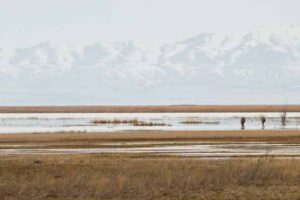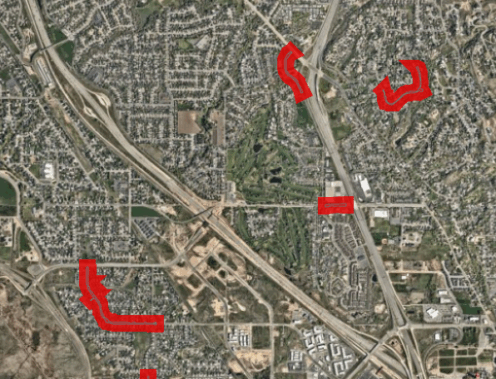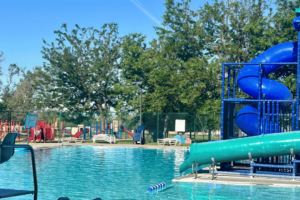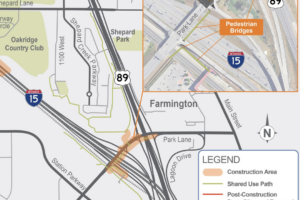Nearly 90% of Farmington City’s drinking water comes from three underground wells located in various locations throughout the City. The remaining 10% comes from the Weber Basin Water Conservancy District.
Water Hardness
Water services that are South of 600 North have a water hardness of 8 grains per gallon.
Water services North of 600 North have a water hardness of 10 grains per gallon.
Click Here to Pay Utility Bill Now
Click Here to Sign Up or Disconnect Utility Services
To pay a utility bill over the phone, call (801) 451-2383, Option 0
Backflow/Cross Connections
Preventing Water Contamination, What Every Water User Should Know!
A Cross Connection is… A physical piping connection between the public drinking water system and anything else. The Concern… Allowing pollutants or contaminants to backflow into the public drinking water system.
WHAT HAPPENS DURING A BACKFLOW… During a backflow, a hose or pipe that is connected to a culinary drinking water system also comes in contact with contaminated water supply.
The contaminated water flows backward through the pipe or hose and into the public culinary water system. Backflow contamination may occur if the water system experiences a low or negative pressure due to a broken water main, fire fighting activities, etc. While this may sound complicated, it is very easily done. A large majority of the backflow incidents are associated with the use of garden hoses.
The Garden Hose and Cross Connections
Examples of Common Cross-Connections include:
- Garden hoses submerged in:
- Buckets
Animal watering troughs
Utility sinks
Swimming or wading pools
- Buckets
2. A spray attachment used on the end of a hose to apply any pesticides to the lawn or garden is a high hazard.
NOTE: Water lines or hoses should never be used to unplug backed up sewer lines.
Protect your Home or Business
ALL POTABLE WATER OUTLETS with hose attachments, other than water heater drains and clothes washer connections MUST HAVE a non-removable hose bib vacuum breaker or an atmospheric vacuum breaker installed to code.
CAN MY LANDSCAPE SPRINKLING SYSTEM BE CONNECTED TO THE PUBLIC DRINKING WATER SYSTEM?
Yes, but the Uniform Plumbing Code requires all residential and commercial landscape sprinkling systems connected to the public drinking water system be equipped with an approved backflow prevention device or assembly.
DO YOU HAVE PRESSURIZED IRRIGATION?
(Benchland Water District OR Weber Basin)
A pressurized irrigation system that is physically connected directly with the public drinking water system can create serious cross-connection problems.
The untreated irrigation water could flow back into the drinking water and carry disease-causing microorganisms that could contaminate the water supplies, making them unsafe to use.↓
ALWAYS HAVE A COMPLETE PHYSICAL SEPARATION BETWEEN THE PRESSURIZED IRRIGATION SUPPLY AND THE PUBLIC DRINKING SYSTEM.
What Do I Do? If your water supply is connected to something that could potentially affect the water quality, a Cross Connection probably exists.
1. Contact a local plumbing supply firm to purchase a backflow protection device.
2. If you have questions about Cross Connections and/or backflow protection devices, call the Farmington City Water Department at 801-451-2624 for more information.
Prevent Frozen Pipes
January is often the time when temperatures fluctuate from moderately warm one week to extremely cold the next. This type of weather can lead to frozen or burst pipes, which often result in damage to property and belongings. There are steps homeowners can take to prevent this from happening.
- Keep the heat in your home above 50 degrees
- Leave cabinet doors open to allow warm air to reach pipes
- It is also a good idea to keep all interior doors open so that heat can flow throughout your home
- Allow faucets to drip slightly
- Caulk any interior or exterior holes or cracks that exist near pipes
- Pipes located in areas that do not have proper insulation, such as basements or attics, may need extra insulation to keep from freezing
- Know the location of your water heater and protect that area against the cold
- Close your garage and other outside doors
- It is wise to keep some water stored for use in case it becomes necessary for public works to temporarily turn off the water supply to your home
A few preventative measures can help homeowners avoid a lot of repair, cleanup and inconvenience. If you would like more information or advice regarding how to protect your property against frozen pipes, please call Farmington Public Works at 801-451-2624
Water Testing
Every three years Farmington City tests the quality of our drinking water. Public works completed the testing for lead and copper in 2022. Samples are not collected from new homes, but twenty samples were collected from older homes that have original kitchen or bathroom faucets and where it is believed that lead exists in the plumbing or lateral.
Farmington is very fortunate to have such non-corrosive water.
- Results for copper cannot exceed the Maximum Contaminant Level (MCL) of 1.3 milligrams per liter. Our high test was .529 milligrams per liter and the low was .011 milligrams per liter.
- Results for lead cannot exceed the Maximum Contaminant Level (MCL) of .015 milligrams per liter. Our high test was .0094 milligrams per liter and the low was NonDetect (ND)
To a large degree the plumbing that was installed in the 1970’s and 1980’s contained a lot of lead, which can be stripped into drinking water by highly corrosive water. Brass fixtures contain a small amount of lead. Lead is no longer used in any new plumbing fixtures.
Why do I have a water overage?
Farmington City has an electronic meter system that records the amount of water that your home uses each month. Your meter is electronically read every month around the 20th and the beginning and ending reading are recorded on your monthly billing statement. Residential customers are charged a flat rate for water services which provides customers with 5000 gallons of water each month. Any usage over the 5000 is charged a water overage fee. Studies completed by the City show the average water usage in Farmington is between 7000 and 8000 gallons per month. Billing fluctuates each month depending on how much water is used in your home.
Possible reasons for overages: running toilet, water softener recycling frequently, leaking faucet, washing cars, swimming pools, swamp coolers and outdoor watering.
Potential Causes of High Water Bills
Will a City water leak affect my water usage?
No, you are only charged for water that flows through your meter.
Does the City offer a credit if I’ve had a water leak?
Typically, no. If there are special circumstances, the City Council will review on a case-by-case basis.
What can I do if my bill is unusually high?
Check over the common causes listed above. This may help to pinpoint the source of the high bill. Contact Public Works at 801-451-2624 to schedule the meter reading to be checked. If the read is found to be accurate, you may need to contact a plumber or other professional to help determine the source of a leak. Property owners are responsible for all private service water lines from the public water main to the residence and for leaks inside the home.







